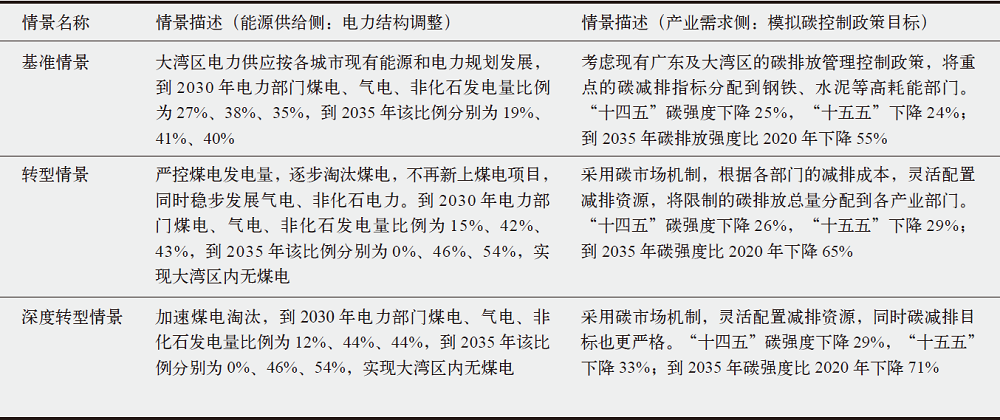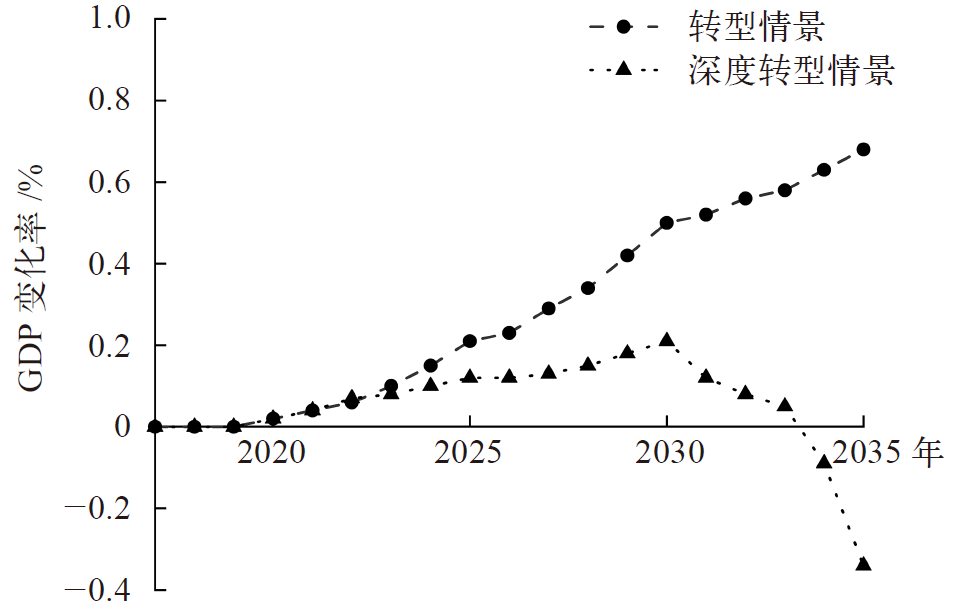Climate Change Research ›› 2022, Vol. 18 ›› Issue (6): 777-790.doi: 10.12006/j.issn.1673-1719.2021.257
• Greenhouse Gas Emissions • Previous Articles Next Articles
Assessment of economic, environmental and health benefits of the energy transition path—take the Guangdong-Hong Kong-Macao Greater Bay Area as an example
LIN Ze-Wei1,2,3, WANG Peng1,2( ), REN Song-Yan1,2,3, XU Hong-Wei4, ZHANG Cong1,2,3,5, ZHAO Dai-Qing1,2
), REN Song-Yan1,2,3, XU Hong-Wei4, ZHANG Cong1,2,3,5, ZHAO Dai-Qing1,2
- 1 Guangzhou Institute of Energy Conversion, Chinese Academy of Sciences, Guangzhou 510640, China
2 Key laboratory of Renewable Energy, Chinese Academy of Sciences, Guangzhou 510640, China
3 University of Chinese Academy of Sciences, Beijing 100049, China
4 Guangdong Provincial Academy of Environmental Science, Guangzhou 510045, China
5 School of Engineering Science, University of Science and Technology of China, Hefei 230027, China
-
Received:2021-11-01Revised:2021-12-21Online:2022-11-30Published:2022-02-18 -
Contact:WANG Peng E-mail:wangpeng@ms.giec.ac.cn
Cite this article
LIN Ze-Wei, WANG Peng, REN Song-Yan, XU Hong-Wei, ZHANG Cong, ZHAO Dai-Qing. Assessment of economic, environmental and health benefits of the energy transition path—take the Guangdong-Hong Kong-Macao Greater Bay Area as an example[J]. Climate Change Research, 2022, 18(6): 777-790.
share this article
Add to citation manager EndNote|Ris|BibTeX
URL: http://www.climatechange.cn/EN/10.12006/j.issn.1673-1719.2021.257

Fig. 11 Economic, environmental and health impacts of transition scenario and deep transition scenario compared to baseline scenario in the GBA during 2020-2035
| [1] | 国家统计局. 中国能源统计年鉴2020[M]. 北京: 中国统计出版社, 2020. |
| National Bureau of Statistics. China energy statistical yearbook 2020[M]. Beijing: China Statistics Press, 2020 (in Chinese) | |
| [2] | Zheng X Q, Lu Y L, Yuan J J, et al. Drivers of change in China’s energy-related CO2 emissions[J]. Proceedings of The National Academy of Science of The United States of America, 2019, 117 (1): 29-36 |
| [3] | 国务院. 粤港澳大湾区发展规划纲要[J]. 国土资源, 2019 (3): 44-45. |
| State Council. The central committee of the communist party of China and the State Council issued the “Guangdong-Hong Kong-Macao Greater Bay Area development plan[J]. Land and Resources, 2019 (3): 44-45 (in Chinese) | |
| [4] | 《粤港澳大湾区能源转型中长期情景研究》项目组. 粤港澳大湾区能源转型中长期情景研究[M]. 北京: 科学出版社, 2020. |
| Project Team of “Mid- and Long-Term Scenario Research on Energy Transition in The Guangdong-Hong Kong-Macao Greater Bay Area”. Mid- and long-term scenario research on energy transition in the Guangdong-Hong Kong-Macao Greater Bay Area[M]. Beijing: Science Press, 2020 (in Chinese) | |
| [5] | WHO. Air pollution[EB/OL]. 2019 [2019-05-10]. http://www.who.int/airpollution/en |
| [6] |
Lelieveld J, Evans J S, Fnais M, et al. The contribution of outdoor air pollution sources to premature mortality on a global scale[J]. Nature, 2015, 525 (7569): 367-371
doi: 10.1038/nature15371 URL |
| [7] | 朱彤. 德国与美国当前能源转型进程比较分析[J]. 国际石油经济, 2016, 24 (5): 1-8. |
| Zhu T. Comparison analysis on current energy transition in Germany and the United States[J]. International Petroleum Economy, 2016, 24 (5): 1-8 (in Chinese) | |
| [8] |
Solomon B D, Krishna K. The coming sustainable energy transition: history, strategies, and outlook[J]. Energy Policy, 2011, 39 (11): 7422-7431
doi: 10.1016/j.enpol.2011.09.009 URL |
| [9] | 项目综合报告编写组. 《中国长期低碳发展战略与转型路径研究》综合报告[J]. 中国人口∙资源与环境, 2020, 30 (11): 1-25. |
| Project Comprehensive Report Writing Team. Comprehensive report on “China’s Long-term Low-Carbon Development Strategy and Transition Path Research”[J]. China Population, Resources and Environment, 2020, 30 (11): 1-25 (in Chinese) | |
| [10] | 马丽梅, 史丹, 裴庆冰. 中国能源低碳转型(2015—2050): 可再生能源发展与可行路径[J]. 中国人口∙资源与环境, 2018, 28 (2): 8-18. |
| Ma L M, Shi D, Pei Q B. Low-carbon energy transition in China (2015-2050): renewable energy development and feasible paths[J]. China Population, Resources and Environment, 2018, 28 (2): 8-18 (in Chinese) | |
| [11] | Jiang K J, He C, Xu X, et al. Transition scenarios of power generation in China under global 2℃ and 1.5℃ targets[J]. Global Energy Inter-connection, 2018, 1 (4): 477-486 |
| [12] | Apergis N, Salim R. Renewable energy consumption and unemployment: evidence from a sample of 80 countries and nonlinear estimates[J]. Applied Economics, 2015, 47 (52-54): 1-20 |
| [13] |
Inglesi-Lotz R. The impact of renewable energy consumption to economic growth: a panel data application[J]. Energy Economics, 2015, 53: 58-63
doi: 10.1016/j.eneco.2015.01.003 URL |
| [14] | 王瑛. 中国可再生能源消费与经济增长的时间序列分析: 以水电、核电、风电为例[J]. 工业技术经济, 2008 (11): 96-99. |
| Wang Y. Time series analysis of China’s renewable energy consumption and economic growth: taking hydropower, nuclear power and wind power as examples[J]. Industrial Technology and Economics, 2008 (11): 96-99 (in Chinese) | |
| [15] | Ocal O, Aslan A. Renewable energy consumption: economic growth nexus in Turkey[J]. Renewable & Sustainable Energy Reviews, 2013, 28: 494-499 |
| [16] | 齐绍洲, 李杨. 能源转型下可再生能源消费对经济增长的门槛效应[J]. 中国人口∙资源与环境, 2018, 28 (2): 19-27. |
| Qi S Z, Li Y. Threshold effect of renewable energy consumption on economic growth under energy transition[J]. China Population, Resources and Environment, 2018, 28 (2): 19-27 (in Chinese) | |
| [17] | 张鸿宇, 黄晓丹, 张达, 等. 加速能源转型的经济社会效益评估[J]. 中国科学院院刊, 2021, 36 (9): 1039-1048. |
| Zhang H Y, Huang X D, Zhang D, et al. Evaluation of economic and social benefits of accelerating energy transition[J]. Proceedings of The Chinese Academy of Sciences, 2021, 36 (9): 1039-1048 (in Chinese) | |
| [18] | 左玉辉. 环境经济学[M]. 北京: 高等教育出版社, 2003. |
| Zuo Y H. Environmental economics[M]. Beijing: Higher Education Press, 2003 (in Chinese) | |
| [19] |
Brook R D, Rajagopalan S, Pope C A, et al. Particulate matter air pollution and cardiovascular disease: an update to the scientific statement from the American heart association[J]. Circulation, 2010, 121 (21): 2331-2378
doi: 10.1161/CIR.0b013e3181dbece1 pmid: 20458016 |
| [20] |
Cooke R M, Wilson A M, Tuomisto J T, et al. A probabilistic characterization of the relationship between fine particulate matter and mortality: elicitation of European experts[J]. Environmental Science & Technology, 2007, 41 (18): 6598-6605
doi: 10.1021/es0714078 URL |
| [21] | Krewski D, Jerrett M, Burnett R T, et al. Extended follow-up and spatial analysis of the American cancer society study linking particulate air pollution and mortality[J]. Research Report, 2009, 140 (140): 5 |
| [22] | 阚海东, 陈秉衡. 我国大气颗粒物暴露与人群健康效应的关系[J]. 环境与健康杂志, 2002 (6): 422-424. |
| Kan H D, Chen B H. The relationship between atmospheric particulate matter exposure and population health effects in China[J]. Journal of Environment and Health, 2002 (6): 422-424 (in Chinese) | |
| [23] | 阚海东, 陈秉衡, 贾健. 城市大气污染健康危险度评价的方法: 第三讲大气污染物暴露与人群健康效应的暴露-反应关系分析(续二)[J]. 环境与健康杂志, 2004 (4): 253-254. |
| Kan H D, Chen B H, Jia J. Methods for evaluating the health risk of urban air pollution: the third lecture on the exposure-response relationship between exposure to air pollutants and population health effects (Continued 2)[J]. Journal of Environment and Health, 2004 (4): 253-254 (in Chinese) | |
| [24] | 黄德生, 张世秋. 京津冀地区控制PM2.5污染的健康效益评估[J]. 中国环境科学, 2013, 33 (1): 166-174. |
| Huang D S, Zhang S Q. Assessment of health benefits of controlling PM2.5 pollution in Beijing-Tianjin-Hebei region[J]. China Environmental Science, 2013, 33 (1): 166-174 (in Chinese) | |
| [25] | 谢杨, 戴瀚程, 花岡達也, 等. PM2.5污染对京津冀地区人群健康影响和经济影响[J]. 中国人口∙资源与环境, 2016, 26 (11): 19-27. |
| Xie Y, Dai H C, Hanaoka T, et al. The impact of PM2.5 pollution on human health and economy in the Beijing-Tianjin-Hebei region[J]. China Population, Resources and Environment, 2016, 26 (11): 19-27 (in Chinese) | |
| [26] | 曾贤刚, 蒋妍. 空气污染健康损失中统计生命价值评估研究[J]. 中国环境科学, 2010, 30 (2): 284-288. |
| Zeng X G, Jiang Y. Research on statistical life value assessment in health loss from air pollution[J]. China Environmental Science, 2010, 30 (2): 284-288 (in Chinese) | |
| [27] | 彭菲, 李雪, 马国霞, 等. 成渝地区大气污染生命统计价值评价研究: 基于单边界二分式的条件价值法[J]. 中国环境管理, 2021, 13 (1): 111, 136-141. |
| Peng F, Li X, Ma G X, et al. Research on the evaluation of vital statistics value of air pollution in Chengdu-Chongqing area: conditional value method based on single boundary dichotomy[J]. China Environmental Management, 2021, 13 (1): 111, 136-141 (in Chinese) | |
| [28] |
Sun D, Fang J, Sun J. Health-related benefits of air quality improvement from coal control in China: evidence from the Jing-Jin-Ji region[J]. Resources, Conservation and Recycling, 2016, 129: 416-423
doi: 10.1016/j.resconrec.2016.09.021 URL |
| [29] | 陈娟, 李巍, 程红光, 等. 北京市大气污染减排潜力及居民健康效益评估[J]. 环境科学研究, 2015, 28 (7): 1114-1121. |
| Chen J, Li W, Cheng H G, et al. Assessment of air pollution reduction potential and residents’ health benefits in Beijing[J]. Environmental Science Research, 2015, 28 (7): 1114-1121 (in Chinese) | |
| [30] | 李嘉宾. 基于融合空气质量模拟与监测数据的颗粒物污染控制健康效益评估[D]. 广州: 华南理工大学, 2019. |
| Li J B. Assessment of health benefits of particulate pollution control based on fusion air quality simulation and monitoring data[D]. Guangzhou: South China University of Technology, 2019 (in Chinese) | |
| [31] | 张欣. 可计算一般均衡模型的基本原理与编程(2版)[M]. 上海: 格致出版社, 2017. |
| Zhang X. Basic principles and programming of computable general equilibrium models (2nd edition)[M]. Shanghai: Gezhi Publishing House, 2017 (in Chinese) | |
| [32] |
Dai H C, Mischke P, Xie X, et al. Closing the gap? Top-down versus bottom-up projections of China’s regional energy use and CO2 emissions[J]. Applied Energy, 2016, 162: 1355-1373
doi: 10.1016/j.apenergy.2015.06.069 URL |
| [33] | 任松彦, 汪鹏, 赵黛青, 等. 基于CGE模型的广东省重点行业碳排放上限及减排路径研究[J]. 生态经济, 2016, 32 (7): 69-73. |
| Ren S Y, Wang P, Zhao D Q, et al. Research on the carbon emission cap and emission reduction path of key industries in Guangdong province based on the CGE model[J]. Ecological Economy, 2016, 32 (7): 69-73 (in Chinese) | |
| [34] | 广东省统计局. 广东省统计年鉴2017—2020[M]. 北京: 中国统计出版社, 2017— 2020. |
| Guangdong Provincial Bureau of Statistics. Guangdong statistical yearbook 2017-2020[M]. Beijing: China Statistics Press, 2017— 2020. (in Chinese) | |
| [35] | 澳门统计局. 澳门统计年鉴[R/OL]. 2016— 2019 [2019-09-26]. http://www.tjcn.org/tjnj/33am/37957.html. |
| Macau Statistics Bureau. Macau statistical yearbook[R/OL]. 2016- 2019 [2019-09-26]. http://www.tjcn.org/tjnj/33am/37957.html (in Chinese) | |
| [36] | OECD. Input-output tables 2015 edition (Hong Kong, China)[EB/OL]. 2016 [2021-07-18]. https://stats.oecd.org/Index.aspx?DataSetCode |
| [37] | 广东省生态环境厅. 广东省企业(单位)二氧化碳排放信息报告指南[EB/OL]. 2021 [2021-02-26]. http://gdee.gd.gov.cn/gkmlpt/content/3/3233/post_3233358.html#3215. |
| Department of Ecology and Environment of Guangdong Province. Guidelines for the reporting of carbon dioxide emissions information by enterprises (units) in Guangdong province[EB/OL]. 2021 [2021-02-26]. http://gdee.gd.gov.cn/gkmlpt/content/3/3233/post_3233358.html#3215 (in Chinese) | |
| [38] | 中华人民共和国卫生部. 中国卫生统计年鉴2020[M]. 北京: 中国协和医科大学出版社, 2020. |
| Ministry of Health of The People’s Republic of China. China health statistical yearbook 2020[M]. Beijing: China Union Medical College Press, 2020 (in Chinese) | |
| [39] | 广东省人民政府. 广东省人民政府关于印发《广东省国民经济和社会发展第十四个五年规划和2035年远景目标纲要》的通知[EB/OL]. 2021 [2021-04-06]. http://www.gd.gov.cn/zwgk/wjk/qbwj/yf/content/post_3268751.html. |
| Guangdong Provincial People’s Government. Notice of the Guangdong provincial People’s government on printing and distributing the “Guangdong Provincial National Economic and Social Development 14th Five-Year Plan and 2035 Vision Outline”[EB/OL]. 2021 [2021-04-06]. http://www.gd.gov.cn/zwgk/wjk/qbwj/yf/content/post_3268751.html (in Chinese) | |
| [40] | 南方电网能源发展研究院. 粤港澳大湾区能源规划研究[R]. 广州: 南方电网能源发展研究院有限责任公司, 2020. |
| China Southern Power Grid Energy Development Research Institute. Research on energy planning of Guangdong-Hong Kong-Macao Greater Bay Area[R]. Guangzhou: China Southern Power Grid Energy Development Research Institute Co., Ltd., 2020 (in Chinese) | |
| [41] | 广东省人民政府. 广东省人民政府关于印发《广东省国民经济和社会发展第十三个五年规划纲要》的通知[J]. 广东省人民政府公报, 2016 (14): 3. |
| People’s Government of Guangdong Province. Notice of the Guangdong Provincial People’s Government on printing and distributing the outline of the Thirteenth Five-year Plan for the national economic and social development of Guangdong province[J]. Bulletin of The Guangdong Provincial People’s Government, 2016 (14): 3 (in Chinese) | |
| [42] | 广东省人民政府. 广东省人民政府关于印发广东省人口发展规划(2017—2030年)的通知[J]. 广东省人民政府公报, 2018 (7): 3-28. |
| People’s Government of Guangdong Province. Notice of the Guangdong Provincial People’s Government on printing and distributing the Guangdong provincial population development plan (2017-2030)[J]. Bulletin of The Guangdong Provincial People’s Government, 2018 (7): 3-28 (in Chinese) | |
| [43] | 高婷, 李国星, 胥美美, 等. 基于支付意愿的大气PM2.5健康经济学损失评价[J]. 环境与健康杂志, 2015, 32 (8): 697-700. |
| Gao T, Li G X, Xu M M, et al. Health economics loss assessment of atmospheric PM2.5 based on willingness to pay[J]. Journal of Environment and Health, 2015, 32 (8): 697-700 (in Chinese) |
| Viewed | ||||||
|
Full text |
|
|||||
|
Abstract |
|
|||||














